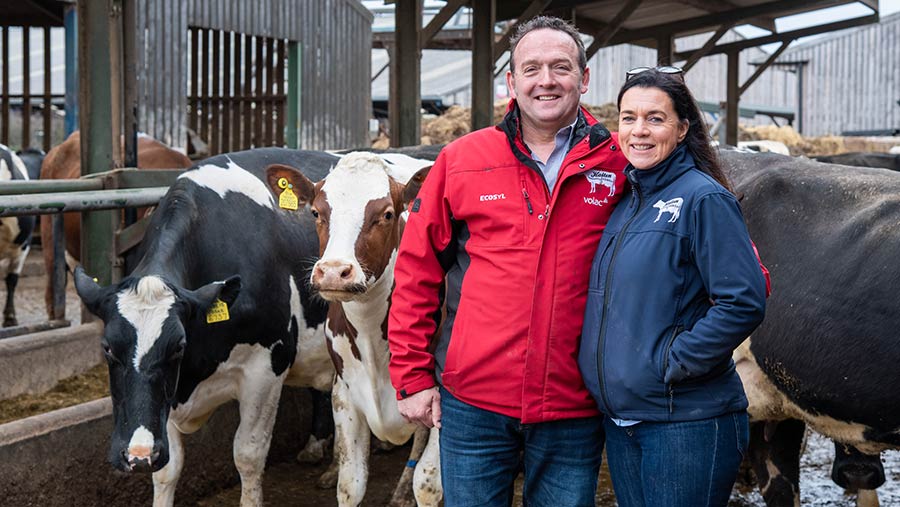Transition Farmer update: Labour shortage halts progress in Cheshire
 Tom and Karen Halton © AHDB Dairy
Tom and Karen Halton © AHDB Dairy Two key transition targets at the Halton family’s dairy farm have been made tougher by the labour shortage in the UK.
Tom and Karen Halton milk 530 ProCross cows (a three-way cross made up of Viking Red, Montbeliarde and Holstein) on a 240ha (593-acre) tenanted dairy farm in Astbury, Cheshire. The unit also sells directly to the public via vending machines and milk rounds.
Halton Farm’s main transition targets are to recruit and retain the right staff, increase direct sales to more customers, and to maintain animal health and welfare.
See also: Advice on how to build and keep a good farm team
Of these three, high health and welfare standards are put above all else, and maintaining and enhancing that policy remains consistently on track.
But the staff recruitment and direct sales goals have both been affected by the national labour shortage.
Staffing challenges
The jobs market has a huge number of openings across all sectors and retaining staff amid a wide range of opportunities has become more challenging, says Mr Halton.
Three staff moved on this summer, including the Haltons’ son, Jack, who set up a contracting business.
Another staff member decided to quit the direct sales venture and intends to travel now that Covid restrictions are easing around the world. A third worker left to join a consultancy.
With the labour requirement high for the three-times-a-day milking and delivery rounds, the farm has had to adapt.
Progress towards expanding the milk round has slowed, with customer deliveries cut back to 450 households.
Workers who formerly operated the delivery enterprise from within the farm’s staff have been handed control and will manage the business themselves, explains Mr Halton.
For the core dairy business, a younger staff member has been promoted to take on more responsibility and is excelling, says Mr Halton.
An overseas worker from South Africa has also joined the team. Although inexperienced in farming, she held a previous role working with animals.
That has enabled her to appreciate the farm’s philosophy of putting the cows’ welfare first and she is learning very quickly, he says.
With labour supply tight, Mr Halton believes it is sometimes easier to employ a fresh starter and develop good practice rather than break the bad habits of an experienced worker.
External recruitment
Meanwhile, outside recruitment continues, with an agency employed to help with the process by carrying out a first screening of candidates.
Mr Halton says that it is easy to put off recruitment, so employing the agency will ensure they can speed up the process and reduce the time taken if they need to.
He adds that to meet goals and get applications from the right people means the farm has to adopt good staff management practices that ensure it stands out in a competitive labour market.
The farm’s high standards are well known and this helps to attract the candidates.
“People have seen us in the press and tweaks such as branded staff uniforms promote our reputation of a strong team spirit,” he says.
Retention strategies
The Haltons have adopted a number of strategies to help retain hard-to-find staff and to show workers they are a highly valued and integral part of the business’s success.
For example, the business offers flexible working to offset the requirement to work long hours.
During Friday afternoons, the team has established a get-together to put work to one side for a while, Mr Halton says.
The farm also offers the opportunity to attend a health facility for a sports massage to help cope with the physical rigours of the daily work.
This is offered free as part of a philosophy about getting people to feel like they want to belong, he explains.
“Hopefully, with this positive approach to recruitment, we will be able continue to make progress as a team and a unit,” Mr Halton says.
